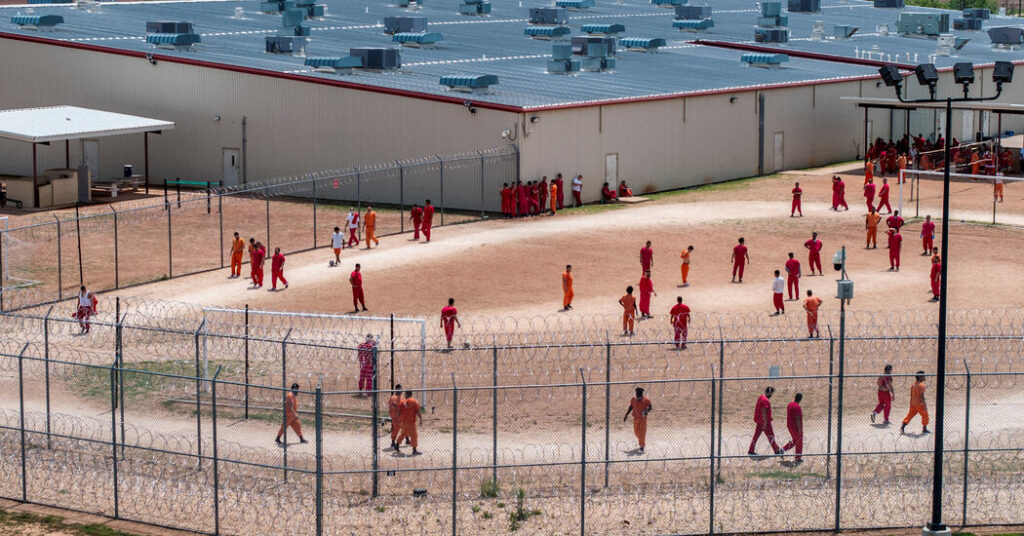The Trump administration asked the Supreme Court on Monday evening for permission to deport a group of nearly 200 Venezuelan migrants accused of being gang members and detained in Texas.
In a filing to the court, the administration contended that “serious difficulties have arisen” from the detention of the group of 176 migrants, who were shielded from deportation in an emergency overnight ruling by the court in mid-April.
According to a declaration by a Homeland Security Department official included in the court filing, a group of 23 migrants had barricaded themselves inside a housing unit for several hours on April 26. The group threatened to take hostages and harm immigration officers, and tried to flood the unit by clogging the toilets, according to the filing.
“The government has a strong interest in promptly removing from the country” gang members “who pose a danger to ICE officers, facility staff and other detainees while in detention,” Solicitor General D. John Sauer wrote in the court filing.
The details of the episode, which had not been previously reported, occurred at the Bluebonnet Detention Facility in Texas, where migrants “barricaded the entrance doors of their housing unit using bed cots, blocked the windows and covered surveillance cameras,” according to a declaration by Joshua D. Johnson, a Homeland Security official and the acting director of the U.S. Customs and Immigration Enforcement’s Dallas Field Office.
The group then “threatened to take hostages” and to “injure” ICE officers and facility staff members, and “remained barricaded in the housing unit for several hours,” Mr. Johnson said in the declaration.
After the episode, the detainees were moved to a different detention facility in the Northern District of Texas, where they remain, Mr. Sauer said. He argued that the episode proved that the migrants presented a danger, even while detained, and that the government should be allowed to deport them.
A lawyer for the detainees did not respond to a request for comment on Monday evening about the court filing’s descriptions of what happened, nor did a spokesperson for the Homeland Security Department.
There have been few public glimpses into the lives of the detained men at the Texas facility. Two days after the alleged episode with the 23 migrants, Reuters flew a drone near the detention center, capturing aerial images of the men held there. In the dirt yard of the Bluebonnet immigration detention center, 31 men, some wearing red jumpsuits designating them as high-risk, formed the letters S-O-S.
The filing marked the latest turn in the Trump administration’s efforts to deport Venezuelan immigrants accused of being members of the gang Tren de Aragua.
In March, President Trump proclaimed that he was invoking the Alien Enemies Act, a rarely used wartime powers law, as a way to deport members of the Venezuelan street gang living in the United States. The law, which was passed in 1798, has been used only three times before in U.S. history, during periods of declared war.
The court has twice weighed in on the administration’s efforts to deport Venezuelans it has accused of being violent gang members.
In mid-March, when Mr. Trump first announced his proclamation, a federal judge had moved to pause the deportations, but planeloads of immigrants were sent to El Salvador anyway. They have been held there ever since, in a prison designated for terrorists.
The Supreme Court agreed in early April, temporarily allowing the administration to proceed with its use of the wartime law, provided that it gave migrants subject to it the opportunity to challenge their deportations in court.
After lawyers for the immigrants detained in Texas received information in mid-April that more than 50 Venezuelans were scheduled to be flown out of the country and presumably to El Salvador, they scrambled to mount court challenges, including an emergency application to the Supreme Court.
In an overnight ruling, the justices temporarily blocked further deportations of the group of Venezuelans held in Texas while they considered the issue. The emergency application has remained pending since then.
In Mr. Sauer’s filing on Monday, he noted that more than three weeks had passed since the court imposed its temporary block.
He asked again that the justices allow deportations under the Alien Enemies Act but said that, at a minimum, the court should allow the government to deport the migrants through other legal avenues.
Hamed Aleaziz contributed to this report.

